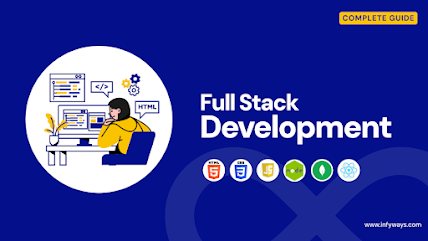Top 7 Full-Stack Tools Powering Modern Web Development
Modern full-stack development has changed drastically over the last few years. Today, developers are expected to work on both the front end (what the user sees) and the back end (the logic and database systems that power the app). This means full-stack developers need a reliable set of tools to efficiently manage the entire application lifecycle.
That’s why many businesses now invest in Full-Stack Development Services to streamline their projects. These services provide expert support across all layers of the tech stack, ensuring faster development, better performance, and scalable solutions tailored to business needs.
If you're new to the field or looking to upgrade your tech stack, this guide will walk you through 7 must-have full-stack tools every modern developer should consider. These tools make it easier to build, test, and maintain web applications in 2025 and beyond.
1. Visual Studio Code (VS Code)
Purpose: Code editor
Why It’s Essential: VS Code is a lightweight yet powerful code editor developed by Microsoft. It supports a wide range of programming languages and comes packed with extensions, syntax highlighting, debugging capabilities, Git integration, and more.
Key Benefits:
Works on Windows, macOS, and Linux
IntelliSense for smart code completions
Integrated terminal
Large extension marketplace (e.g., Prettier, ESLint, Docker support)
GitHub Copilot integration for AI-assisted coding
Whether you're writing JavaScript, Python, or PHP, VS Code can adapt to your workflow and improve your productivity.
2. Node.js
Purpose: JavaScript runtime for back-end development
Why It’s Essential: Node.js allows developers to write server-side logic using JavaScript. It's fast, efficient, and backed by a huge community. Its non-blocking architecture makes it ideal for building real-time applications like chat apps, online gaming, and streaming platforms.
Key Benefits:
Uses the same language (JavaScript) for both front-end and back-end
Massive package ecosystem with npm (Node Package Manager)
Lightweight and scalable
Perfect for microservices architecture
Node.js is the go-to solution for developers who want a unified tech stack across their entire application.
3. React.js
Purpose: Front-end JavaScript library
Why It’s Essential: React.js, maintained by Meta (formerly Facebook), is a library used to build fast and interactive user interfaces. It promotes a component-based architecture, making code reusable and easier to maintain.
Key Benefits:
Component-driven development
Virtual DOM for faster UI updates
Strong developer community
Compatible with React Native for mobile app development
React's performance and scalability have made it a top choice for businesses and developers looking to create engaging web applications.
4. Express.js
Purpose: Back-end web application framework for Node.js
Why It’s Essential: Express.js is a minimalist framework that simplifies the process of building back-end APIs and services. It allows developers to handle HTTP requests, middleware, and routes with minimal configuration.
Key Benefits:
Fast and flexible
Integrates easily with databases like MongoDB and PostgreSQL
Middleware support
Huge ecosystem of plugins and tools
If you're using Node.js, Express.js makes building and managing server-side logic much easier.
5. MongoDB
Purpose: NoSQL database
Why It’s Essential: MongoDB is a document-oriented database that stores data in flexible, JSON-like documents. It works exceptionally well with JavaScript and Node.js, making it a natural fit for full-stack development.
Key Benefits:
Schema-less design for flexible data models
Scalable and high-performance
Built-in support for replication and sharding
Integration with cloud services via MongoDB Atlas
MongoDB allows developers to rapidly prototype and deploy scalable applications without worrying about complex SQL schemas.
6. Docker
Purpose: Containerization platform
Why It’s Essential: Docker allows developers to package applications and their dependencies into containers. These containers can run consistently on any environment, whether it's your laptop, a testing server, or a cloud platform.
Key Benefits:
Eliminate "it works on my machine" issues
Faster deployment and rollback
Supports microservices architecture
Works well with CI/CD tools
Docker simplifies the process of developing, testing, and deploying full-stack applications across various environments.
7. Postman
Purpose: API testing and collaboration tool
Why It’s Essential: Postman is a popular tool for testing RESTful APIs. It allows developers to send requests to an API and inspect the responses, making debugging and collaboration much easier.
Key Benefits:
Easy interface for sending API requests
Automate test cases for APIs
Team collaboration and documentation
Environment management for multiple stages (dev, test, prod)
APIs are the glue between the front-end and back-end. Postman ensures that this glue is strong and reliable.
Wrapping Up: Why These Tools Matter
In 2025, full-stack development is all about efficiency, scalability, and collaboration. The tools listed above are designed to make your job as a developer easier, whether you're working solo, freelancing, or part of a large engineering team. Partnering with experienced Software development services can further enhance your development process by integrating smart automation, intelligent code suggestions, and advanced analytics, giving you a competitive edge in building modern applications.
Here's a quick recap of what each tool brings to the table:
By incorporating these tools into your workflow, you’re setting yourself up for success in modern full-stack development. Choose the tools that fit your project best and keep exploring new ones as the ecosystem evolves.
Remember: great tools alone don't make great developers, but they definitely make the journey smoother.





Comments
Post a Comment